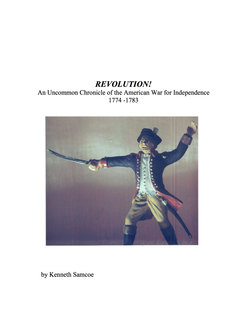Читать книгу Revolution An Uncommon Chronicle of the American War for Independence - Kenneth JD Samcoe - Страница 11
На сайте Литреса книга снята с продажи.
GAGE GETS HELP FROM HOME
ОглавлениеHowe, Clinton, Burgoyne Accompany Fresh Troops
I am in no doubt you will be able to conquer America at last, but a horrid bloody scene will be opened here as never was in New England before.
Peter Oliver, Loyalist Sympathizer
To His Brother in England
June 1, 1775
Boston, Massachusetts: May 25, 1775. Loyalist citizens in Boston breathed a collective sigh of relief when they saw a large fleet of British troops and warships sail into the harbor late this morning. The ships carried 4,000 additional troops under Major Generals William Howe, Henry Clinton and John Burgoyne. Commanding General Thomas Gage now has 10,000 trained, well equipped British regulars at his disposal. Estimates of militiamen camped in and around rebel headquarters at Cambridge vary between 8,000 and 13,000.
The lack of unity or cohesiveness among the rebels prompted the Massachusetts Provincial Congress to request that the Continental Congress sitting in Philadelphia assume responsibility by creating and controlling an army of all the militia around Cambridge. Many in Massachusetts fear the large, disorganized militia as much as they do Gage’s regulars, encamped in Boston.
The arrival of William Howe has caused speculation that Parliament might be leaning toward reconciliation. General Howe served the British for nine years in the colonies during the French and Indian wars. He is known to have affection for New England. Colonists erected a monument in Westminster Abbey honoring his older brother, George Augustus, who was killed at Ticonderoga in 1758.
In related news, Lord Dunmore, Royal Governor of Virginia, seized 20 barrels of gunpowder from military magazines in Williamsburg. Dunmore took the powder in retaliation against a series of resolutions enacted by the Virginia Convention held at Richmond in March. Patrick Henry set the tone of the convention when he rose on the floor and condemned the British Ministry, suggesting the attack on Lexington was an act of war. “Our chains are forged,” he was reported saying. “Their clanking can be heard on the plains of Boston. The war is inevitable and let it come!”
The convention delegates resolved that a well regulated militia should be raised to relieve England of any responsibility in protecting the colony.
